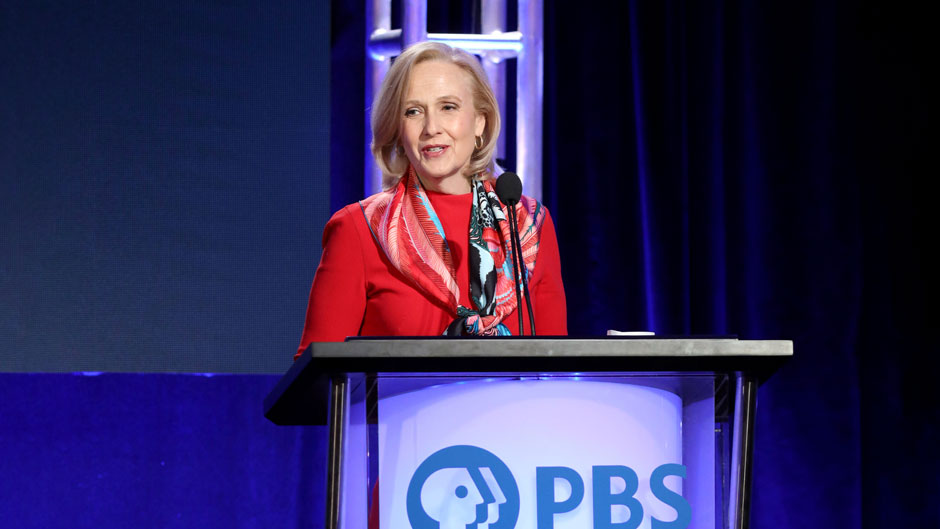Paula Kerger, president and CEO of the Public Broadcasting Service (PBS) for the past 15 years, discussed issues of leadership, developing media literacy, and the network’s mission to serve the public good, in a virtual conversation on Wednesday for the Cobb Leadership Lecture, an annual talk with transformative public figures.
John Quelch, dean of the University of Miami Patti and Allan Herbert Business School, and Karin Wilkins, dean of the School of Communication, posed questions to Kerger, the longest-serving chief executive in PBS history.
The CEO differentiated the news focus of the nation’s largest non-commercial media station from other media outlets and from other public broadcasting entities such as the BBC in the United Kingdom.
“Our decisions on what to cover and what issues to follow are based on striving to improve the lives of individuals and improve the life of the community,” Kerger indicated. “We’re not an entertainment company. We have a service focus that is really educational and, if we really hit our mark, inspirational.”
She highlighted that statistics show that PBS is among the most trusted sources for news and information.
“We are a public-private partnership,” Kerger pointed out. “And why do people give money? Because they trust you. So, part of it is the structure of who we are. We’re very trusted, and we take that to heart. It becomes this beautiful virtuous circle.”
Philanthropic contributions provide the majority of funding for the private-public organization, she explained. The lesser percentage of federal support is earmarked for infrastructure and varies at the organizations 330 member stations. For example, federal support for the PBS affiliate in Cookeville, Tennessee, makes up about 60 percent of the budget, where an urban affiliate might receive only 6 percent of its budget from federal dollars, according to Kerger.
Quelch commented on the fact that there are claims the organization exercises a liberal bias.
“There are very few American citizens that view us as ‘liberal,’ ” Kerger said. We work very hard to bring many points of view forward and look very carefully at the audience specifically around news programs because, very often, that’s where that label of ‘liberal’ is tied.
“I can tell you that the people who are watching ‘News Hour,’ watching‘Frontline,’ and other news shows come from all different cross sections of the political landscape,” she continued. “We look at this claim very carefully and want to make sure that we’re not contributing to the problem of creating an echo chamber. We want to bring lots of perspectives forward.”
Meaningful storytelling is the “undercurrent” of all that PBS strives for, she said, while emphasizing that the organization’s ethos is “to cover a story in the same way that you would want someone to write a story about you.”
The CEO also noted that “whatever format they’re built in, the thing that we continue to wrestle with and try to figure out is how these stories can actually make a difference in people’s lives.”
Quelch asked how PBS stands up to the onslaught of fake news.
“What we are able to contribute to communities is to serve as a public square,” Kerger said. “We have a large audience that cuts across all ages, backgrounds, and political ideas. The role of public broadcasting is not to come through with the answers to the thorny questions, but to bring forth the background to help better understand those issues.”
She highlighted the “Frontline” documentary series as emblematic of the network’s dedication to unbiased journalism.
“ ‘Frontline’ brings forward the most important issues of our time and is one of the most popular, not just on our network, but on all of television,” Kerger said. “In addition to publishing or streaming the documentary, what the producer has done is to post all the interviews in their entirety as an effort at transparency.’’
She referred to the challenges created by the current media landscape where content based on algorithms pushes information that reinforces reflected preferences and behaviors.
“We’re all receiving different news,” she said. ”We’re not all getting the same info, so there is a true lack of understanding.”
Kerger acknowledged the huge shifts in the media landscape during the past 15 years since she has been at the helm of PBS. The landscape now is incredibly fragmented.
“This is a profoundly difficult situation in a time of enormous change,” Kerger acknowledged. “Where there are some that hope we can go back, this is a time when you have to be willing to lean forward and do some really scary things.
“I believe that academic organizations, media organizations, and policymakers coming together can help sort some of this out,” Kerger said. “A lot of issues, if not solved, could at least be partially worked through if we were able to come together in a way that we’re able to look at information within a certain base of commonly accepted facts.”

